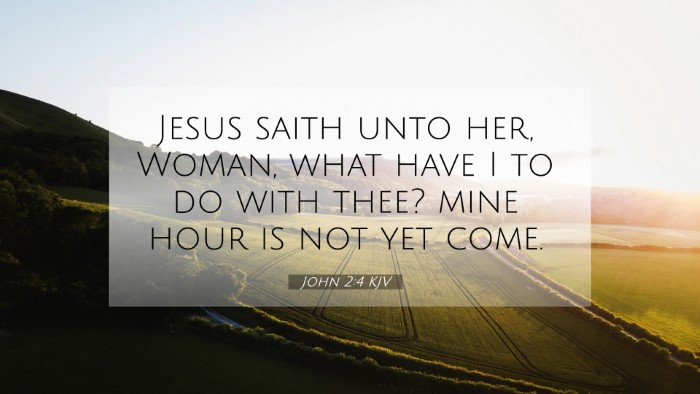Old Testament
Genesis Exodus Leviticus Numbers Deuteronomy Joshua Judges Ruth 1 Samuel 2 Samuel 1 Kings 2 Kings 1 Chronicles 2 Chronicles Ezra Nehemiah Esther Job Psalms Proverbs Ecclesiastes Song of Solomon Isaiah Jeremiah Lamentations Ezekiel Daniel Hosea Joel Amos Obadiah Jonah Micah Nahum Habakkuk Zephaniah Haggai Zechariah MalachiJohn 2:4 Similar Verses
John 2:4 Cross References
Jesus saith unto her, Woman, what have I to do with thee? mine hour is not yet come.
Uncover the Rich Themes and Topics of This Bible Verse
Listed below are the Bible themes associated with John 2:4. We invite you to explore each theme to gain deeper insights into the Scriptures.
John 2:4 Cross Reference Verses
This section features a detailed cross-reference designed to enrich your understanding of the Scriptures. Below, you will find carefully selected verses that echo the themes and teachings related to John 2:4 KJV. Click on any image to explore detailed analyses of related Bible verses and uncover deeper theological insights.
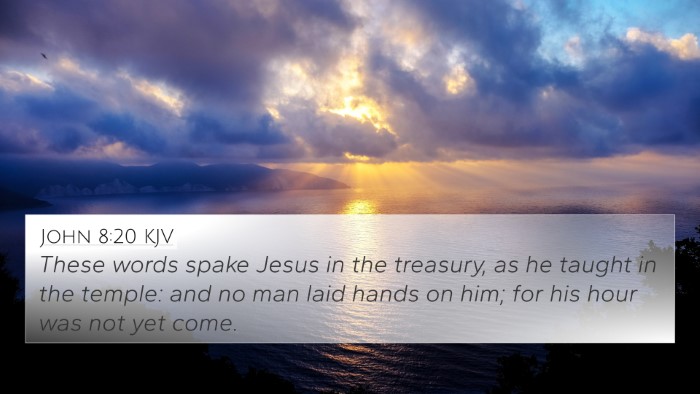
John 8:20 (KJV) »
These words spake Jesus in the treasury, as he taught in the temple: and no man laid hands on him; for his hour was not yet come.

John 13:1 (KJV) »
Now before the feast of the passover, when Jesus knew that his hour was come that he should depart out of this world unto the Father, having loved his own which were in the world, he loved them unto the end.
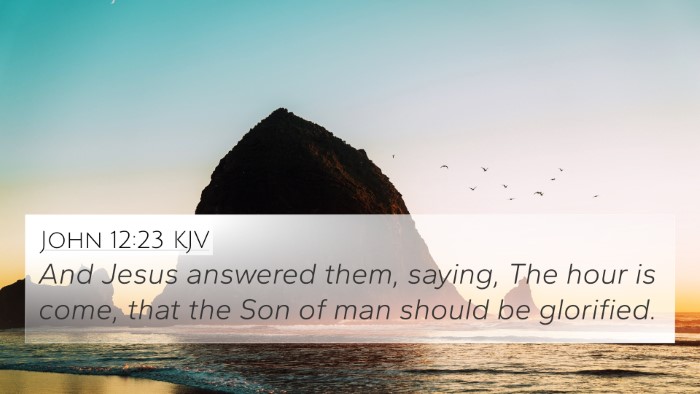
John 12:23 (KJV) »
And Jesus answered them, saying, The hour is come, that the Son of man should be glorified.
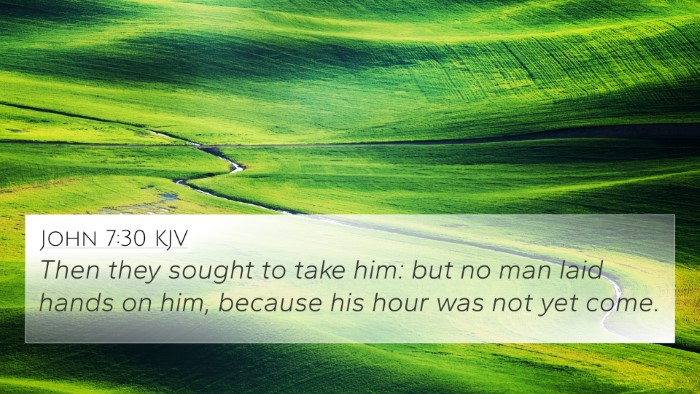
John 7:30 (KJV) »
Then they sought to take him: but no man laid hands on him, because his hour was not yet come.
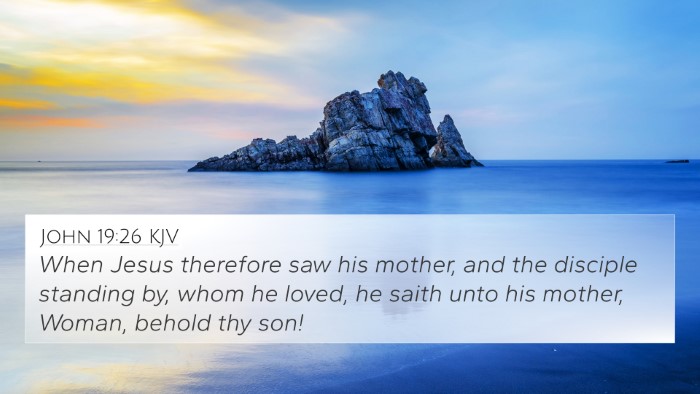
John 19:26 (KJV) »
When Jesus therefore saw his mother, and the disciple standing by, whom he loved, he saith unto his mother, Woman, behold thy son!
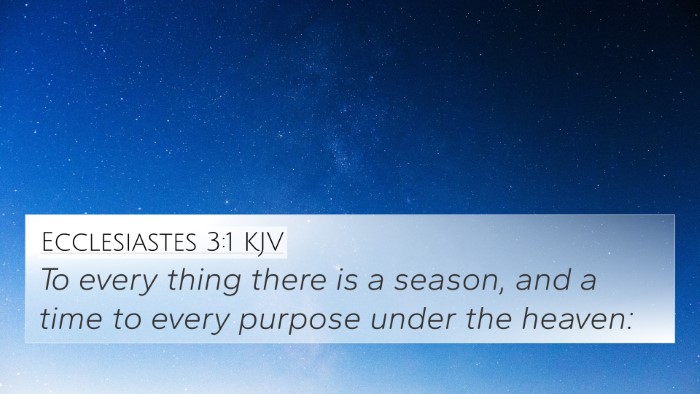
Ecclesiastes 3:1 (KJV) »
To every thing there is a season, and a time to every purpose under the heaven:

2 Corinthians 5:16 (KJV) »
Wherefore henceforth know we no man after the flesh: yea, though we have known Christ after the flesh, yet now henceforth know we him no more.
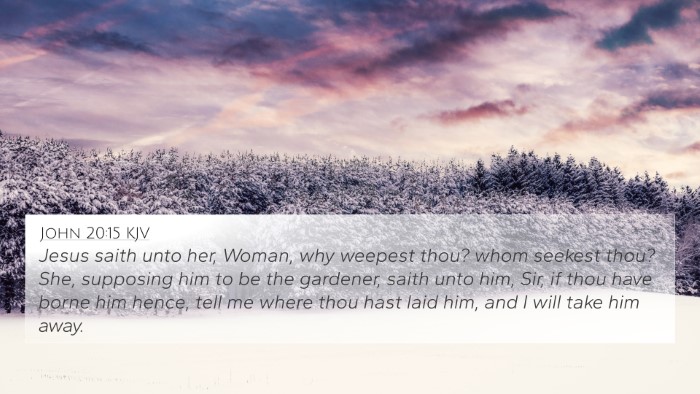
John 20:15 (KJV) »
Jesus saith unto her, Woman, why weepest thou? whom seekest thou? She, supposing him to be the gardener, saith unto him, Sir, if thou have borne him hence, tell me where thou hast laid him, and I will take him away.
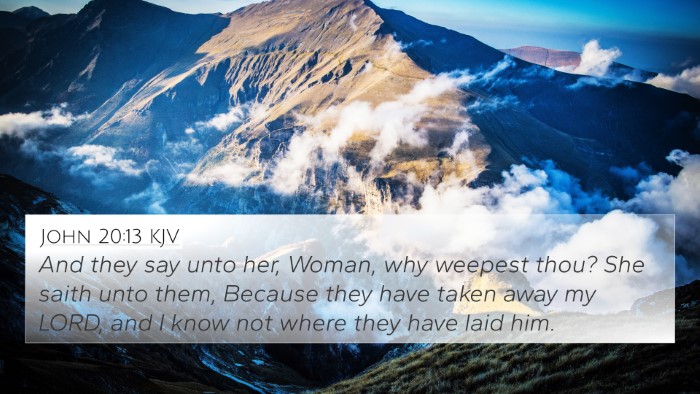
John 20:13 (KJV) »
And they say unto her, Woman, why weepest thou? She saith unto them, Because they have taken away my LORD, and I know not where they have laid him.
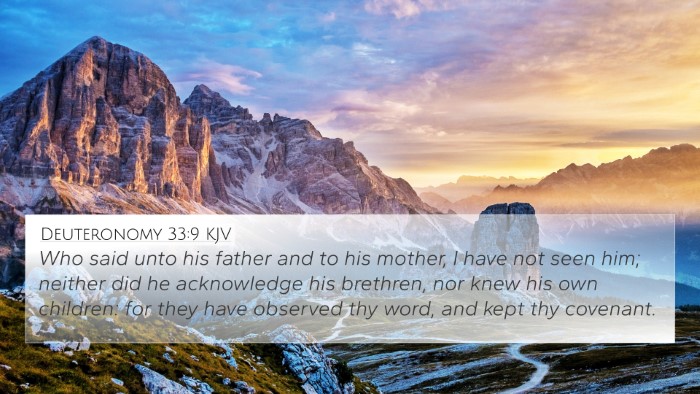
Deuteronomy 33:9 (KJV) »
Who said unto his father and to his mother, I have not seen him; neither did he acknowledge his brethren, nor knew his own children: for they have observed thy word, and kept thy covenant.
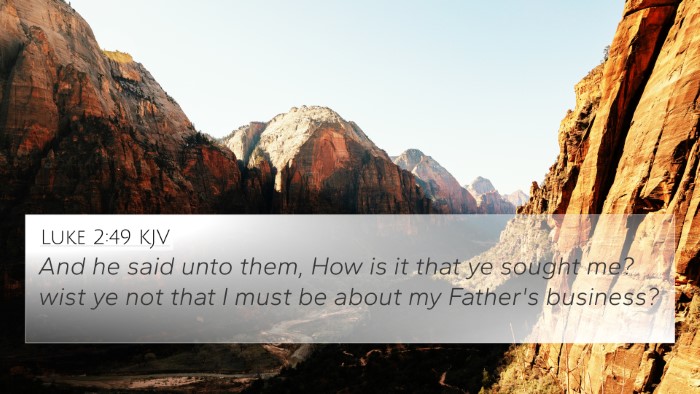
Luke 2:49 (KJV) »
And he said unto them, How is it that ye sought me? wist ye not that I must be about my Father's business?
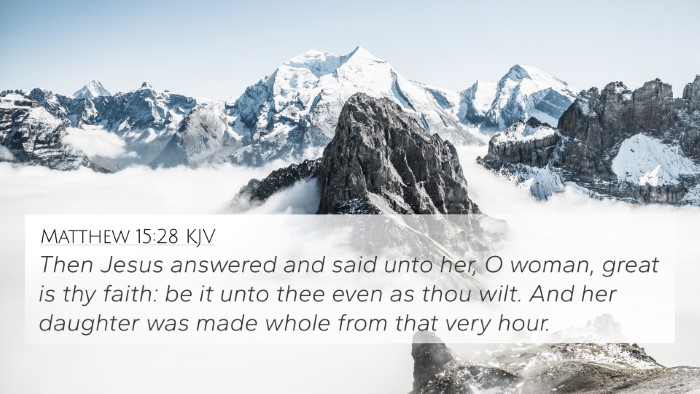
Matthew 15:28 (KJV) »
Then Jesus answered and said unto her, O woman, great is thy faith: be it unto thee even as thou wilt. And her daughter was made whole from that very hour.
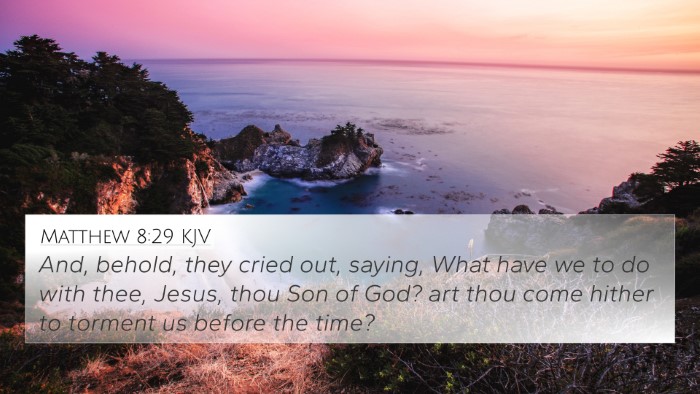
Matthew 8:29 (KJV) »
And, behold, they cried out, saying, What have we to do with thee, Jesus, thou Son of God? art thou come hither to torment us before the time?
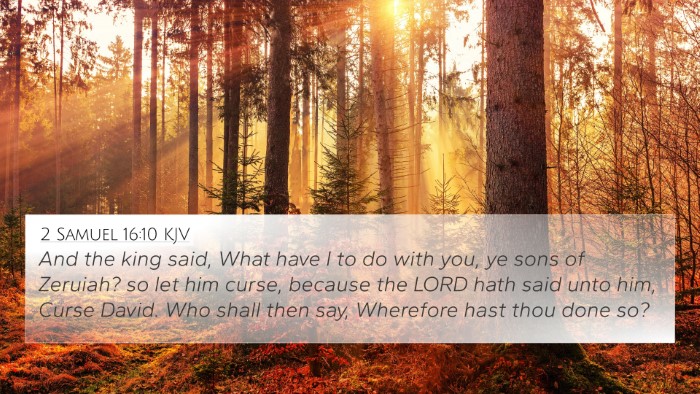
2 Samuel 16:10 (KJV) »
And the king said, What have I to do with you, ye sons of Zeruiah? so let him curse, because the LORD hath said unto him, Curse David. Who shall then say, Wherefore hast thou done so?
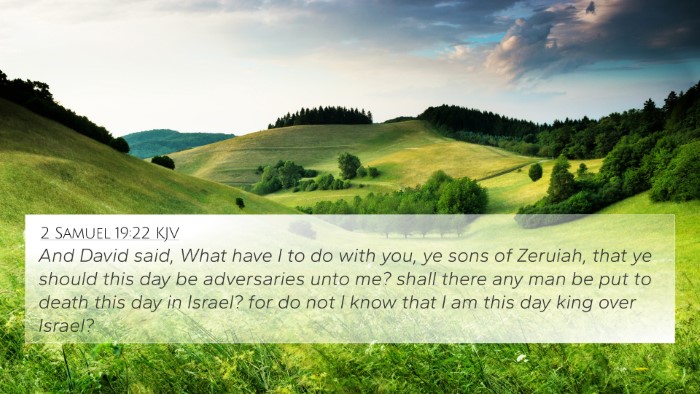
2 Samuel 19:22 (KJV) »
And David said, What have I to do with you, ye sons of Zeruiah, that ye should this day be adversaries unto me? shall there any man be put to death this day in Israel? for do not I know that I am this day king over Israel?
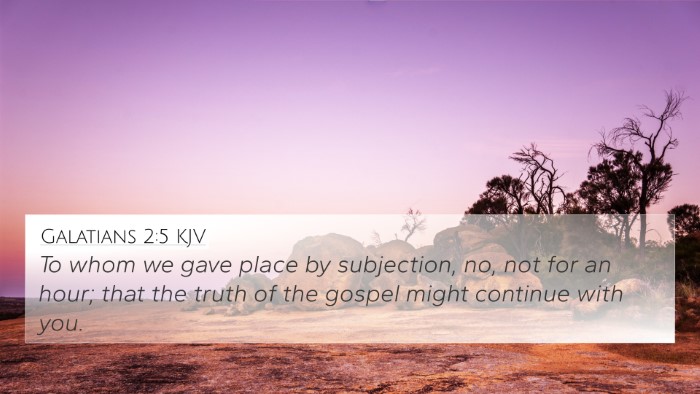
Galatians 2:5 (KJV) »
To whom we gave place by subjection, no, not for an hour; that the truth of the gospel might continue with you.
John 2:4 Verse Analysis and Similar Verses
Understanding John 2:4
John 2:4 states: "Jesus said to her, 'Woman, what does this have to do with me? My hour has not yet come.'" This verse occurs during the account of the wedding at Cana where Jesus performs His first miracle by turning water into wine.
Meaning and Commentary
This verse carries profound theological implications as it marks the beginning of Jesus's public ministry and signifies His relationship with both Mary, His mother, and His mission on Earth.
Matthew Henry notes that Jesus addresses Mary respectfully by calling her "Woman," which suggests a certain distance in His public ministry and indicates that He is not bound by human relationships when it comes to fulfilling His divine mission.
Albert Barnes emphasizes that the phrase "What does this have to do with me?" indicates a separation from human concerns and stresses Jesus’s ultimate objective, which is aligned with divine timing rather than human expectation.
Adam Clarke elaborates that Jesus's mention of "My hour has not yet come" foreshadows the divine time for His sacrifice, hinting that His miracles and ministry are ultimately leading toward the cross.
Thematic Connections
John 2:4 connects deeply with the themes of divine timing and revelation throughout the New Testament, showing how Jesus is fully aware of His divine purpose. This verse can be explored through several biblical cross-references:
- John 7:30: "So they were seeking to arrest him, but no one laid a hand on him, because his hour had not yet come." This reinforces the idea of divine timing in His ministry.
- John 12:23: "And Jesus answered them, 'The hour has come for the Son of Man to be glorified.'" Here, Jesus identifies a focal moment related to His purpose on Earth.
- Matthew 26:18: "He said, 'Go into the city to a certain man and say to him, ‘The Teacher says, My time is at hand. I will keep the Passover at your house with my disciples.'” This verse mentions the imminent arrival of His ultimate mission.
- Luke 2:49: "And he said to them, 'Why were you looking for me? Did you not know that I must be in my Father’s house?'" This reflects Jesus’s understanding of His divine purpose from an early age.
- John 19:30: "When Jesus had received the sour wine, he said, 'It is finished,' and he bowed his head and gave up his spirit." This culmination ties back to the recognition of His hour, marking the completion of His mission.
- Mark 1:15: "And saying, 'The time is fulfilled, and the kingdom of God is at hand; repent and believe in the gospel.'" This mirrors the urgency of Jesus's mission regarding divine timing.
- John 10:18: "No one takes it from me, but I lay it down of my own accord. I have authority to lay it down, and I have authority to take it up again." This reaffirms Christ’s control over the timing of His life and purpose.
Inter-Biblical Dialogue
John 2:4 can be viewed through a comparative lens by exploring how other scriptures relate to His identity and mission. The connections between various Bible verses can be enlightening, offering insight into how different biblical texts illuminate this singular moment:
- Isaiah 53:3: "He was despised and rejected by men; a man of sorrows, and acquainted with grief." This shares the theme of misunderstood identity that Jesus faces even here.
- Hebrews 5:8: "Although he was a son, he learned obedience through what he suffered." His path to glory was marked by suffering and obedience to God's timeline.
- John 1:11: "He came to his own, and his own people did not receive him." A prelude to the misunderstandings Jesus would encounter, starting even with Mary here at the wedding.
- Mark 3:21: "And when his family heard it, they went out to seize him, for they were saying, 'He is out of his mind.'" This shows the tension between Jesus's divine mission and familial understanding.
Tools for Bible Cross-Referencing
To better understand the connections between Bible verses and how they complement each other, various tools can be employed:
- Bible Concordance: A useful tool for finding specific verses and their references.
- Bible Cross-Reference Guide: Helps in identifying related scriptures and themes.
- Cross-Reference Bible Study: Effective methods to delve into contextual themes across scriptures.
- Bible Reference Resources: Various compilations of scriptures by themes or topics, allowing for enhanced study.
Conclusion
John 2:4 serves as a significant moment in the Gospel narrative, demonstrating Jesus's relationship with His mother, His awareness of divine timing, and the anticipatory nature of His mission. Understanding this verse in the context of the entire Scripture enhances our comprehension of Jesus's ministry and the overarching themes of obedience, divine purpose, and redemption found throughout the Bible.


